12:08 East of Bucharest (A fost sau n-a fost?)
Romania, 2006
Color, 89 minutes
Romanian with English subtitles
Directed, written, and produced: Corneliu Porumboiu
Director of photography: Marius Panduru
Editor: Roxana Szel
Music: Rotaria
Production designer: Daniel Răduţă
Production: 42 Km Film
On the sixteenth anniversary of Romania’s 1989 revolution, small town journalist and TV station owner Virgil Jderescu plans a live discussion about the uprising on his daily talk show “Issue of the Day.” His question for guests and live callers alike is also the original Romanian title of the film: “Was there a revolution in our town, or wasn’t there?” The town in question is director Porumboiu’s native Vaslui. His guests are a high school history teacher (and alcoholic), Mănescu, and “uncle” Piscoci, a retiree and part-time Santa Claus. Both are self-proclaimed local revolutionaries. The live debate turns into a confrontation between the two guests as well as callers contesting their claims. Perspectives, definitions, locations, minute-to-minute counts, motives and backgrounds are thrown into the battle over the genuineness of the revolutionaries and of the revolution itself, mirroring larger political controversies over what many Romanians these days cautiously refer to as “the 1989 events.”
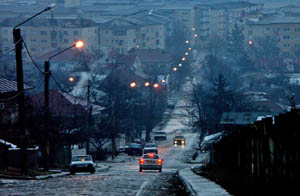 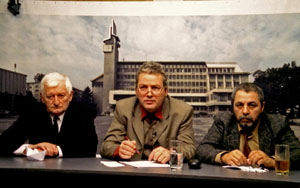
Candid moments like Mănescu’s awfully long hesitation in answering the question “Who won?” are a clue to the painful issue of the real winners of the transition in a small town where everybody knows everyone else, and where a former secret service agent has become the town’s prosperous businessman.
“The revolution is like the streetlights, they light from the center out to the most humble back street” concludes Mr. Piscoci in response to Jderescu’s question. People are cowards and, after all, national events such as revolutions are created through the collective adoption of a single self-glorifying narrative coming from “the center.”
The last caller, however, draws a line in the mud of hypocrisy, imposture, and duplicity around the revolution: “I didn’t call to judge you. I just called to let you know that it’s snowing…”
Director
 Corneliu Porumboiu was born in 1975. After studying management at the Academy of Economic Studies in Bucharest, he went on to study film directing at the “I.L. Caragiale” University of Drama and Film in Bucharest. He has directed such short films as Gone with the Wine, Liviu’s Dream (Forum Berlinale 2006), and A Trip to the City, an award-winning film in Cannes 2004. His feature debut, 12:08 East of Bucharest was screened in the Quinzaine des Réalisateurs section at the 2006 Cannes Film Festival, where it won the Golden Camera for Best First Feature. The movie also won the Grand Prize and the Audience Award in the Transylvania International Film Festival in 2006. Corneliu Porumboiu was born in 1975. After studying management at the Academy of Economic Studies in Bucharest, he went on to study film directing at the “I.L. Caragiale” University of Drama and Film in Bucharest. He has directed such short films as Gone with the Wine, Liviu’s Dream (Forum Berlinale 2006), and A Trip to the City, an award-winning film in Cannes 2004. His feature debut, 12:08 East of Bucharest was screened in the Quinzaine des Réalisateurs section at the 2006 Cannes Film Festival, where it won the Golden Camera for Best First Feature. The movie also won the Grand Prize and the Audience Award in the Transylvania International Film Festival in 2006.
Filmography
2006 12:08 East of Bucharest (A fost sau n-a fost?)
2004 Liviu's Dream
2003 A Trip to the City
California Dreamin’ (Endless)
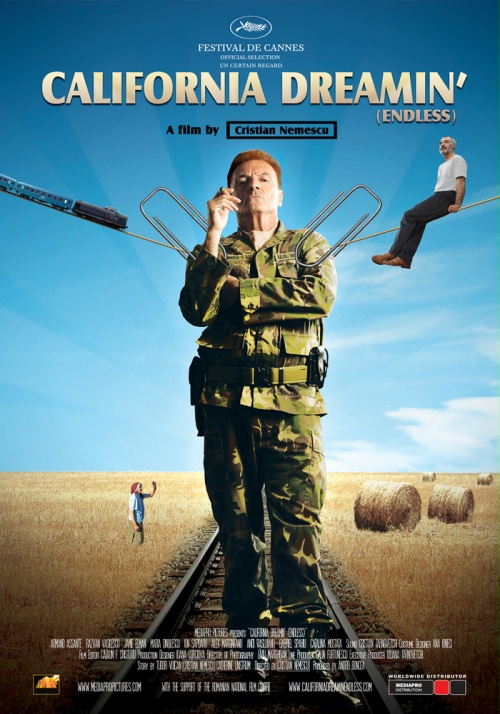 Romania, 2007 Romania, 2007
Color and Black-and-white, 155 minutes
Romanian and English with subtitles
Director: Cristian Nemescu
Screenwriters: Cristian Nemescu, Catherine Linstrum, Tudor Voican
Cinematography: Liviu Marghidan
Film editor: Cătălin Cristuiu
Art director: Ioana Corciova
Sound editor: Andrei Toncu
Producer: Andrei Boncea
Production: Mediapro Pictures and Temple Film
Inspired by an actual incident that happened during the War in Kosovo in 1999, California Dreamin’ is a forceful drama of poignant realism and pungent satire that illustrates Romanians’ fascination with the American dream. Doiaru, the head of a village railway station, sets his mind on blocking the advance of a NATO transport until customs papers are received. Led by Captain Jones, a man of few words in love with his mission, the American soldiers find themselves stranded in a place about which they have no idea. To their surprise, local people seem to have awaited them for a long time and spare no effort in welcoming them to their community. The mayor throws a party in their honor, spiced up with Romanian traditional food, beer, local folk dances, American Rock’n Roll songs, and last but not least beautiful girls easily charmed by the soldiers.
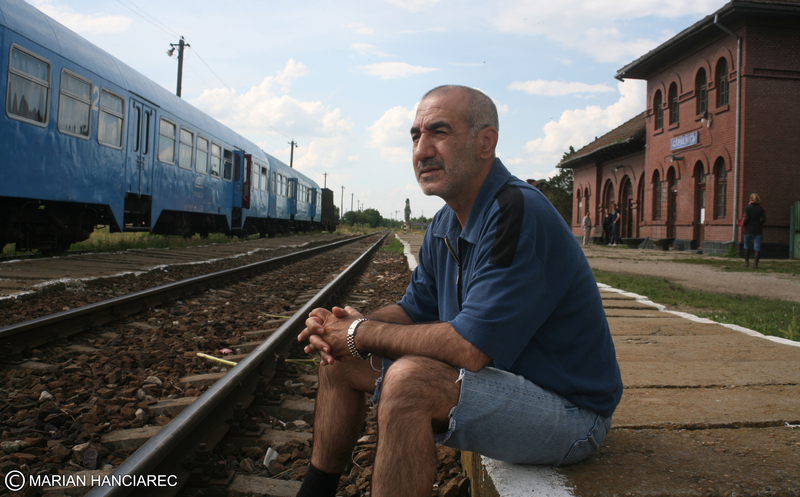
Doiaru is the only person who is not enthusiastic about the Americans’ arrival, nor is he willing to let them continue their journey. Although he bluntly explains to Captain Jones the illegal status of the transport in the absence of official authorization, he is far from law-abiding himself. He regularly extorts from the freight trains that pass through his station, and he is close to taking over a factory driven to bankruptcy by his corruption. Doiaru’s spiteful attitude towards the American troops turns out to be rooted in the West’s sell-out of Eastern Europe in the last stages of World War II, which he has remembered from childhood.
Flashbacks of those traumatic times, filmed in black-and-white, gradually throw more light on the intrigue as they intertwine with the contemporary events filmed in color. One subplot centers on the love story between Monica, Doiaru’s daughter, and David, a marine sergeant in the American battalion. Feeling suffocated by the village environment, Monica hopes to escape to a better and happier world at a distance from home.
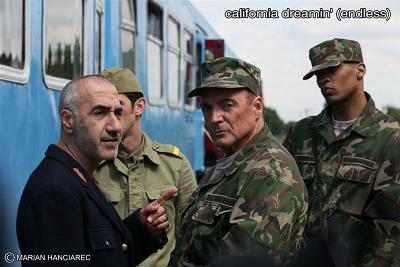
California Dreamin’ masterfully combines a tale of revenge with a coming of age story in a convoluted plot that offers no immediate solution to the problems the characters face. Their struggle is accentuated by the filming technique as the camera focuses closely on significant details in some of the most emotionally charged scenes―such as a toy plane drifting in front of a car or the tips of Monica’s shoes as she rises on her toes. Mirroring the neo-realist trend of Romanian contemporary cinematography, California Dreamin’ dwells on the contests between the global and the local, and that between generations. On the one hand, it shows Romanians’ disillusionment with Americans who had failed to rescue them from Soviet domination after World War Two; on the other hand, it presents the younger generation’s clear admiration for Americans, who embody free spirit and prosperity in the post-communist context.
Director
 Cristian Nemescu was born in Bucharest, Romania, in 1979. He graduated from the Film Directing Department of the Academy for Theater and Film in Bucharest in 2003. His graduation short movie, C-Block Story won the Best Movie Award at the NYU International Student Film Festival and the European Short Film Award at the Angers European First Film Festival. California Dreamin’ is Nemescu’s only feature film. As he died in a car accident before fully completing its editing, the movie was subtitled Endless. It has won many prestigious prizes, such as Un Certain Regard at the Cannes Film Festival, the Iris Award, the Audience Award, and the TV Canvas Award at the European Film Festival in Brussels. Cristian Nemescu was born in Bucharest, Romania, in 1979. He graduated from the Film Directing Department of the Academy for Theater and Film in Bucharest in 2003. His graduation short movie, C-Block Story won the Best Movie Award at the NYU International Student Film Festival and the European Short Film Award at the Angers European First Film Festival. California Dreamin’ is Nemescu’s only feature film. As he died in a car accident before fully completing its editing, the movie was subtitled Endless. It has won many prestigious prizes, such as Un Certain Regard at the Cannes Film Festival, the Iris Award, the Audience Award, and the TV Canvas Award at the European Film Festival in Brussels.
Filmography
2007 California Dreamin’
2006 Marilena from P7
2003 C Block Story (short)
2001 Mihai and Cristina (short)
2001 Mecano (short)
2000 People Living in Apartments Are Crazy about Music (short)
2000 Kitsch Witches, 2 FM (documentary)
Occident
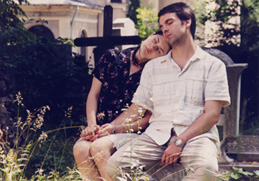 Romania, 2002 Romania, 2002
Color, 105 minutes
Romanian with English subtitles
Director and screenwriter: Cristian Mungiu
Director of photography: Vivi Dragan Vasile
Camera: Oleg Mutu
Music: Petru Margineanu and Ioan Gyuri Pascu.
Production: Temple Film
An engaging comedy with tragic overtones, Occident (in English the title could be rendered as “The West”) captures the difficult interpersonal relationships of the post-communist young generation, while they desperately scramble to establish themselves in the transition period.
Luci, who has a B.A. in forestry and can barely make ends meet, and his girlfriend Sorina, a kindergarten teacher of English, argue over their future after being unceremoniously evicted from their apartment. Having almost no one to turn to, they go to the cemetery and, by Sorina’s father’s grave, they wait for an omen that would decide their fate. While Luci promises to do everything possible to find a better job, in advertising, of course, Sorina thinks that their only hope is to leave the country in search of a brighter future in Western Europe. The much-expected sign from beyond splits them further apart and links their fate to that of another set of characters, similarly troubled by the desire to escape the insecurity they face in post-communist society.
As it turns out, Luci is no stranger to the idea of escape to the West, having tried to cross the border illegally before the revolution. Yet, for him, the “Occident” is an irreversibly lost paradise, just as elusive as the once sought after capitalist society, emerging oddly—to say the least—in post-communist Romania.
Mungiu deftly intertwines three different narratives, each of which focuses on a different pair of characters. The threads of the transition stories are so entangled that the movie takes one by surprise until its very end when the pieces of the puzzle come together. The paradoxical realities of post-1989 society are unveiled as the characters nostalgically ponder over memories of communist school hymns evocative of an imminent utopia, or as they dress up in funny costumes to advertise new commercial products that promise to fulfill all desires. The ultimate guarantee of success in the search for either a rich Westerner to wed or a well-paid job seems to be a combination of bribery and nepotism, both well-known strategies of the communist past; which is not to say that there has been no change at all: signs of the transformation are the McDonald’s restaurants, chosen as ideal places for romantic encounters with foreigners, and spectacular advertising banners that contrast sharply with the misery of the characters’ own lived experience. Through inspired juxtapositions of hilarious, yet dramatic situations, in which reality fails to match expectations, Mungiu succeeds in conveying the ambiguities, clichés, and disillusionments of the transition period in Romania.
Director
 Cristian Mungiu was born in Iaşi, Romania, in 1968. He has a degree in English and American Literature from Iaşi University and a degree in film directing from the Academy for Theater and Film in Bucharest. His graduation film, The Hand of Paulista represented Romania at the student Oscar awards in 1999. Occident is his first feature film. It has received several prestigious prizes, among these the Best New Director Award at Leeds International Film Festival; the Best Picture Award at the Transylvania International Film Festival; the Great Prize for Best Picture at the Festival International du Premier Film, Annonay; the Audience Award at the International Thessaloniki Film Festival; and the FIPRESCI Critics Award. Mungiu recently directed 4 Months, 3 Weeks, and 2 Days, which won the Palme D’Or at the 60th Cannes Festival last summer. Cristian Mungiu was born in Iaşi, Romania, in 1968. He has a degree in English and American Literature from Iaşi University and a degree in film directing from the Academy for Theater and Film in Bucharest. His graduation film, The Hand of Paulista represented Romania at the student Oscar awards in 1999. Occident is his first feature film. It has received several prestigious prizes, among these the Best New Director Award at Leeds International Film Festival; the Best Picture Award at the Transylvania International Film Festival; the Great Prize for Best Picture at the Festival International du Premier Film, Annonay; the Audience Award at the International Thessaloniki Film Festival; and the FIPRESCI Critics Award. Mungiu recently directed 4 Months, 3 Weeks, and 2 Days, which won the Palme D’Or at the 60th Cannes Festival last summer.
Filmography
2007 4 Weeks, 3 Weeks and 2 Days
2005 Lost and Found
2002 Occident
2000 The Firemen’s Choir (short)
2000 Nothing by Chance (short)
2000 Zapping (short film)
1998 The Hand of Paulista (short)
1997 Mariana (short)
1996 Horia Viorel Brief (documentary short)
Stuff and Dough (Marfa şi banii)
Romania, 2001
Color, 91 minutes
Director: Cristi Puiu
Screenwriters: Răzvan Rădulescu and Cristi Puiu
Production designer: Andrea Hasnas
Cinematographer: Silviu Stavilă
Editor: Nita Chivulescu
Sound Designer: Andrei Pap
Producer: Cristi Puiu
Production: Rofilm/National Center for Cinematography in Romania
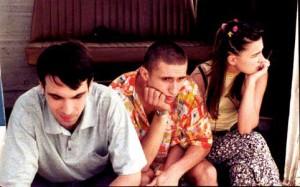
The plot of this low budget road movie takes place in 1999, on the road between Bucharest and Constanţa, Romania’s major port on the Black Sea. The protagonist, Ovidiu, is the son of a couple running a small convenience stall from their ground floor apartment. Such tiny private businesses sprang up everywhere after 1989. He is asked by powerful family friend Mr. Ivanov to deliver a package to Bucharest in exchange for $2,000. He accepts without too many qualms, thinking of the dough—a full third of the capital he needs to open his own stall or “boutique” as Romanians affectionately call these miniature shops.
He takes along his best friend, Vali, and the latter’s girlfriend, Betty, on the four-hour car trip. The delivery mission turns into a nightmare when they become the target of a chase by a couple of violent and apparently armed strangers. They manage to lose their pursuers and make the delivery in Bucharest; in a plea for normality, they even stop to purchase merchandise in a wholesale supermarket for Ovidiu’s parents’ stall. Ovidiu, Vali, and Betty try to talk each other into believing that the highway chase was an absurd accident and that the chasers mistook them for other people. A friend who has lived in the States for two years, says Ovidiu, has never seen any of that stuff they show you in the movies—the guns, the chase, the police. He’s never seen it once!
On their way back to Constanţa, with Vali and Betty sleeping in the back of the van, Ovidiu stops to check out the scene of an auto accident. What he sees, along with the welcome-back meeting with Mr. Ivanov, provide a cold awakening to a world that is drawing unnervingly close to the big screen, although with no hint of glamour in sight.
Director
 Cristi Puiu first studied painting at the École Superieure d’Arts Visuels in Geneva in 1992. After his first year of art school he switched to film and graduated in 1996. He returned to Romania and began writing and directing. In 2001, his first Feature, Stuff and Dough, premiered in Cannes and received the FIPRESCI award at the Thessaloniki Film Festival. In 2002, he co-wrote the script for Niki and Flo (directed by Lucian Pintilie), and two years later, his film Cigarettes and Coffee won the Golden Bear for Best Short Film in Berlin. His second feature film, The Death of Mr. Lăzărescu, opened in Cannes 2005, where it won the Un Certain Regard award, and later four awards, including best director, in TIFF 2005. The film was nominated for the Independent Spirit Award in 2006 and was released to wide critical acclaim in many countries, including France, the UK, and the US, and became the highest profile Romanian film ever. Cristi Puiu first studied painting at the École Superieure d’Arts Visuels in Geneva in 1992. After his first year of art school he switched to film and graduated in 1996. He returned to Romania and began writing and directing. In 2001, his first Feature, Stuff and Dough, premiered in Cannes and received the FIPRESCI award at the Thessaloniki Film Festival. In 2002, he co-wrote the script for Niki and Flo (directed by Lucian Pintilie), and two years later, his film Cigarettes and Coffee won the Golden Bear for Best Short Film in Berlin. His second feature film, The Death of Mr. Lăzărescu, opened in Cannes 2005, where it won the Un Certain Regard award, and later four awards, including best director, in TIFF 2005. The film was nominated for the Independent Spirit Award in 2006 and was released to wide critical acclaim in many countries, including France, the UK, and the US, and became the highest profile Romanian film ever.
Filmography
2008 Scene of a Crime
2006 Offset (screenwriter)
2005 The Death of Mr. Lăzărescu
2004 Cigarettes and Coffee
2003 Niki and Flo (screenwriter)
2001 Stuff and Dough
1996 25.12. Bucharest, North Railway Station
1995 Before Breakfast
The Paper will be Blue (Hîrtia va fi albastră)
Romania, 2006
Color, 95 minutes
Romanian with English subtitles
Director: Radu Muntean
Sscreenwriters: Radu Muntean, Alexandru Baciu, and Răzvan Rădulescu
Cinematographer: Tudor Lucaciu
Sound: Electric Brother
Executive producer: Dragoş Vîlcu
Production: Multimedia Est & Antena 1
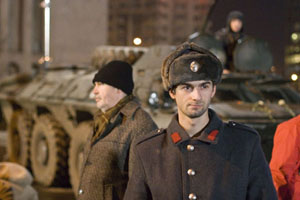 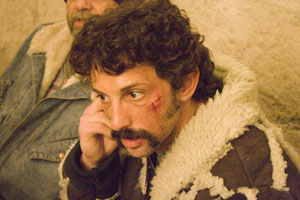
The Paper Will Be Blue reconstitutes the bleak atmosphere of the Romanian Revolution of December 1989, zooming in on a moment when the long-awaited fall of the communist regime was still somewhat in question. The movie opens abruptly with a tragic scene, in which two young soldiers, relieved to have survived a night on duty, descend from an armored vehicle and get shot by men in uniform. The traumatic opening slowly gives way to a less tense, but equally cumbersome scene in which a militia squad of four young recruits, led by Lieutenant Neagu, tries to ensure that the street protests against the communist regime do not get out of hand. Their mission, however, is no longer entirely clear: there are rumors that the fleeing communist dictator Nicolae Ceauşescu has been caught and that terrorists are attacking the national television station. Communication over the militia portable station is frequently cut off and the squad turns to the broadcasts disseminated over the public radio system in order to make sense of what is happening.
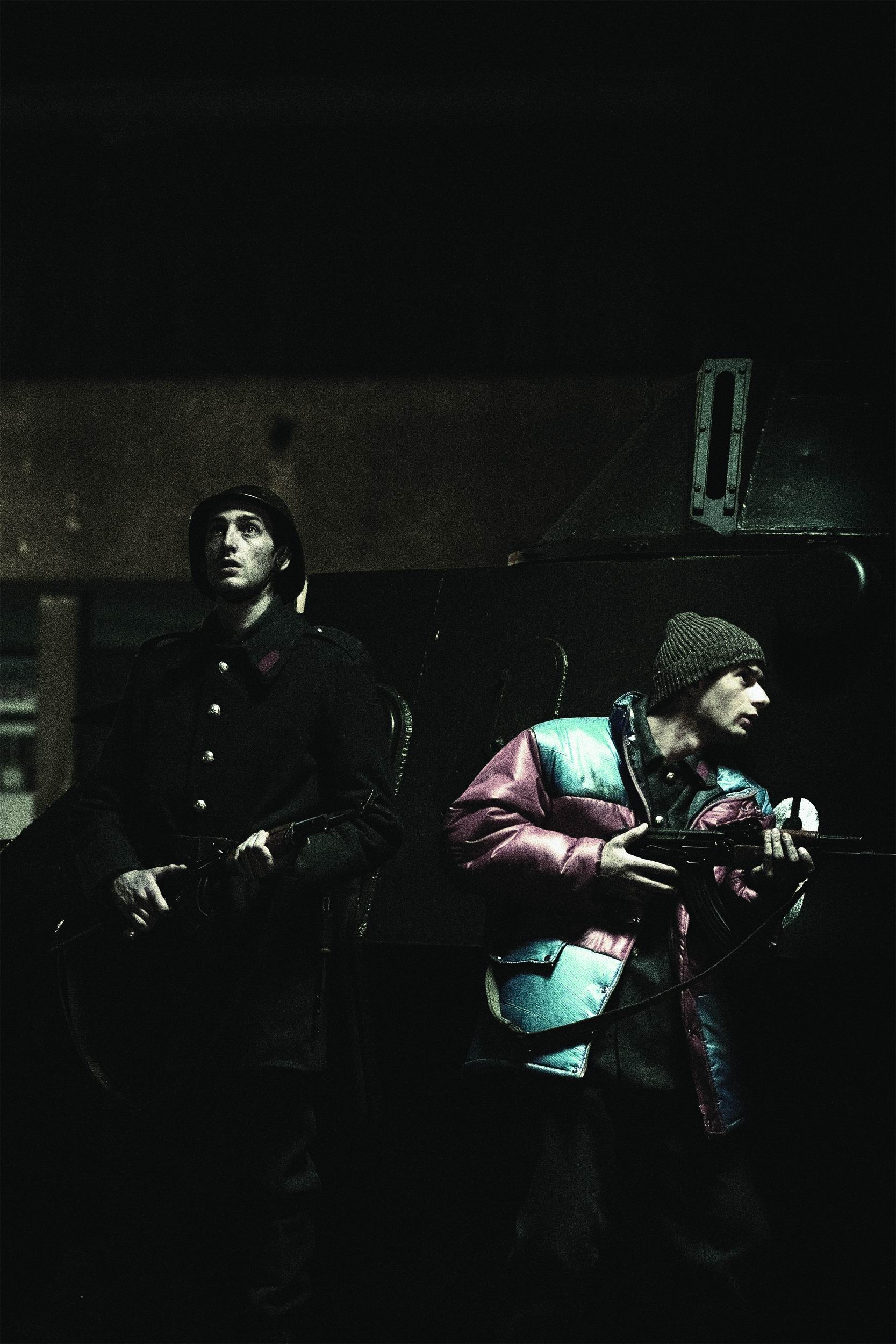 Costi, a young conscript who has a privileged position in the squad because he is the son of a well-connected doctor, bravely defies the lieutenant’s orders and tries to persuade the others to join the insurgency. He is disarmed due to his rebellious attitude and he leaves the squad to go defend the television station. Enthusiastic and fully dedicated to the cause of the crowds fighting against the wobbling communist government, Costi joins a combat unit in a villa. This leads to his being mistaken for a terrorist infiltrator. Fearing the potential bitter consequences of Costi’s desertion from the squad, Lieutenant Neagu launches a search for the young conscript, loosely reminiscent of Saving Private Ryan. Costi is reunited with his team, but the tempestuous incidents are far from over at the end of the night. Costi, a young conscript who has a privileged position in the squad because he is the son of a well-connected doctor, bravely defies the lieutenant’s orders and tries to persuade the others to join the insurgency. He is disarmed due to his rebellious attitude and he leaves the squad to go defend the television station. Enthusiastic and fully dedicated to the cause of the crowds fighting against the wobbling communist government, Costi joins a combat unit in a villa. This leads to his being mistaken for a terrorist infiltrator. Fearing the potential bitter consequences of Costi’s desertion from the squad, Lieutenant Neagu launches a search for the young conscript, loosely reminiscent of Saving Private Ryan. Costi is reunited with his team, but the tempestuous incidents are far from over at the end of the night.
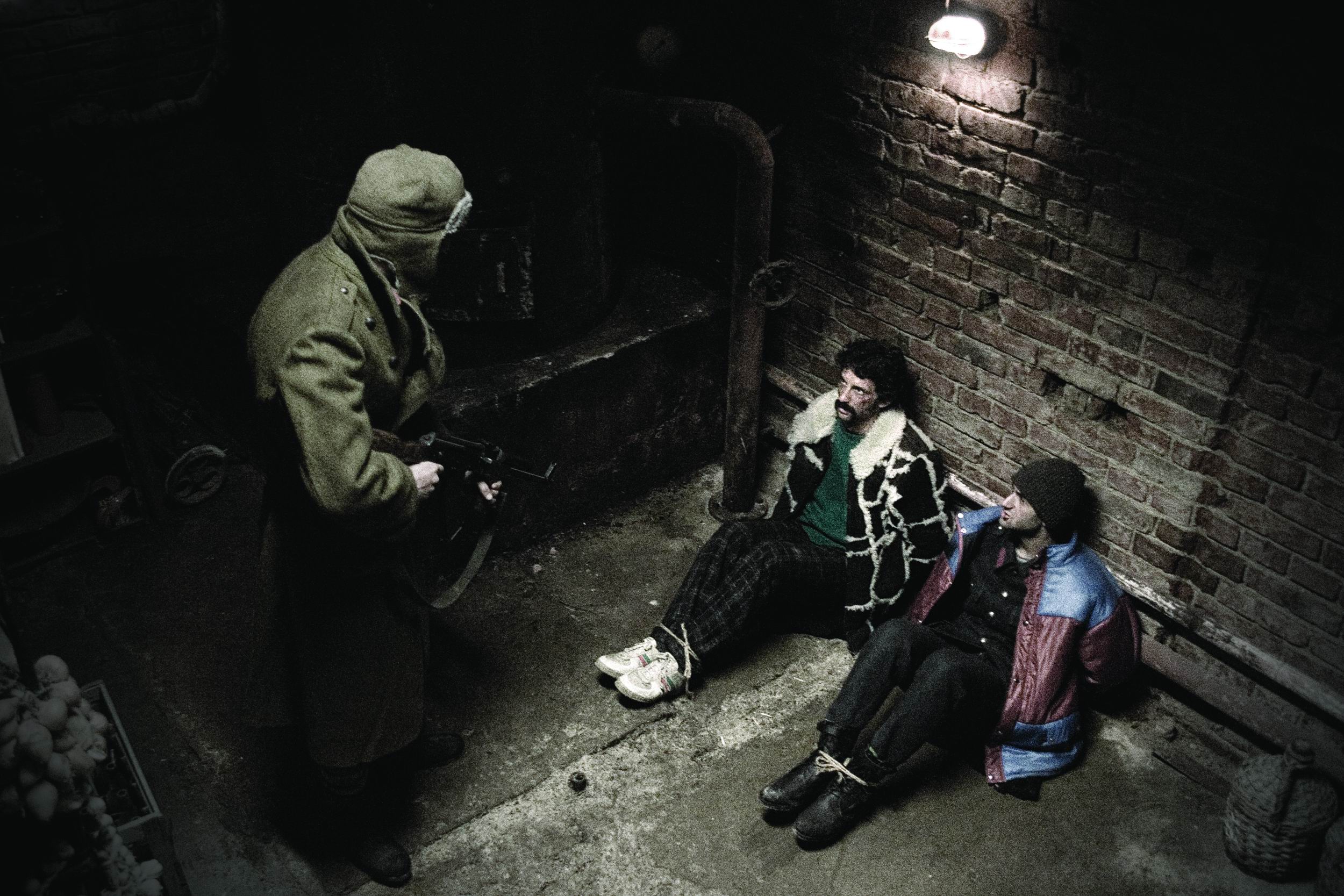 Filmed in Bucharest over a period of twenty eight days, Radu Muntean’s The Paper Will Be Blue is a drama of tantalizing realism that minutely recreates a nightmarish story that takes place in the decisive moments of the Romanian Revolution between 22 and 23 December. Muntean incorporates archival footage of the live broadcasts in order to reveal the implications of a historic event that is transformed into a media event, as people try to discern the truth of revolutionary reality via the images and declarations transmitted by the national radio and television stations. The trust in the media is surprising, given their former subservience to the dictatorial regime. But then no other source of credible information exists. Filmed in Bucharest over a period of twenty eight days, Radu Muntean’s The Paper Will Be Blue is a drama of tantalizing realism that minutely recreates a nightmarish story that takes place in the decisive moments of the Romanian Revolution between 22 and 23 December. Muntean incorporates archival footage of the live broadcasts in order to reveal the implications of a historic event that is transformed into a media event, as people try to discern the truth of revolutionary reality via the images and declarations transmitted by the national radio and television stations. The trust in the media is surprising, given their former subservience to the dictatorial regime. But then no other source of credible information exists.
The grim colors and dim lights of the film suggest both the confusion and inner turmoil experienced by the characters, and the grey areas of history—hardly any clearer in 2006, than in 1989. Refraining from passing any judgments on the forces behind the Revolution—viewed by some as an outcome of genuine insurgency and by others as a carefully and cynically staged coup d’état—Radu Muntean tells the story from the point of view of a militia squad that is a mere pawn in the unfolding events. The personal level of the conscripts’ story overtakes the magnitude of the historical account. However, the soldiers are ultimately subjected to forces that escape their control. Miscommunication and lack of coordination between the militia and the army leads to a disastrous end for the young heroes, who for a moment thought they had escaped the quagmire of history and could enjoy freedom after the fall of communism.
Offical Site of The Paper Will Be Blue
Director
 Radu Muntean was born in Bucharest, Romania, in 1971. He has a degree in film directing from the Academy for Theater and Film in Bucharest. As a student, he directed three short films: They Are Ours Too (1992, documentary); Lindenfeld (1994, documentary); and She (1994 (short). The Paper Will Be Blue was awarded the Best Film prize at EURASIA International Film Festival in Antalya, the CICAE Award at the Sarajevo Film Festival, and the Jury Special Prize at Namur Francophone Film Festival. Radu Muntean was born in Bucharest, Romania, in 1971. He has a degree in film directing from the Academy for Theater and Film in Bucharest. As a student, he directed three short films: They Are Ours Too (1992, documentary); Lindenfeld (1994, documentary); and She (1994 (short). The Paper Will Be Blue was awarded the Best Film prize at EURASIA International Film Festival in Antalya, the CICAE Award at the Sarajevo Film Festival, and the Jury Special Prize at Namur Francophone Film Festival.
Filmography
2006 The Paper Will Be Blue
2002 The Fury
1996 The Tragic Love Story of the Two
1996 Life Is Elsewhere
1994 Lindenfeld (documentary)
1994 She (short)
1992 They Are Ours Too (documentary)
The Reenactment (Reconstituirea)
Romania, 1986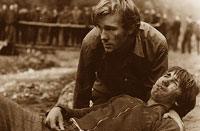
Black-and-white, 100 minutes
Romanian with English subtitles
Director and screenwriter: Lucian Pintilie
Cinematographer: Sergiu Huzum
Production desgin: Aureliu Ionescu
Sound editor: Andrei Papp
Production: Bucureşti Film
This black-and-white feature, shot in the style of a documentary (which it largely is), is Lucian Pintilie’s most acclaimed film produced under communism, and one of the earliest attempts at indirectly criticizing Romania’s communist regime through highly sophisticated, subtle, aesthetic expression. The protagonists are two young men who, after a bar brawl, are subjected to an investigation. With no prior record, rather than being sentenced, they are forced to re-enact the incident. The contrast between the minor offense and the tragic end caused by the reenactment is a powerful metaphor for a society in which individuals no longer control their lives and become victims of propagandistic justice and bureaucratic incompetence. Banned shortly after its release and only screened again in Romania in 1990, after the fall of communism, the movie is also a critique of socialist realism, as well as a tragic-comic reflection on the ineptitude and cruelty of the communist authorities, amplified by people’s indifference to the drama of others, and by their ultimate inability to prevent it.
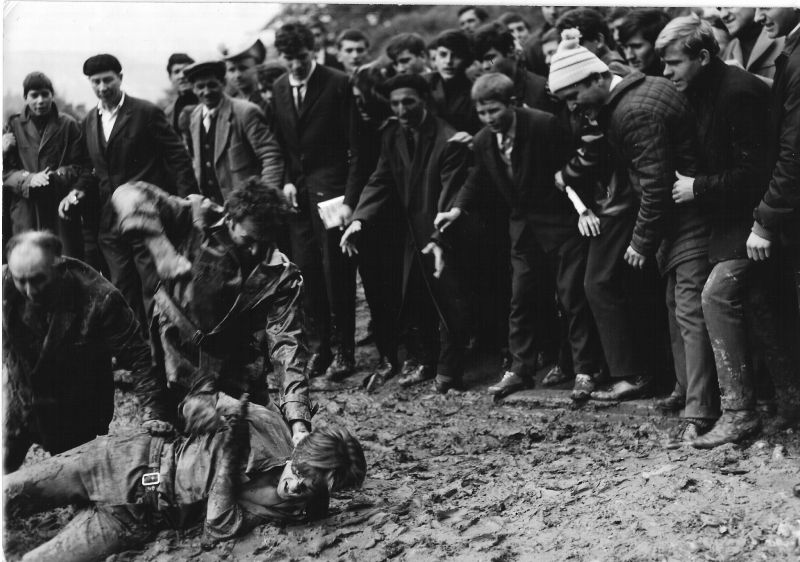
The movie is based on a short story by Horia Pătraşcu, in turn based on a true story witnessed by the writer in the early 1960s in his native Caransebeş. The local police really did have the drunken youths reconstruct the scene of their insignificant “crime” in order to reeducate them and the local public about the evils of drink in the charged days before the national communist holiday of August 23. The tragic outcome of the movie plot does not depart from the original incident.
Director
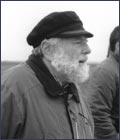 Born in 1933 in southern Bessarabia (an area incorporated into Soviet Ukraine in the 1940s), Lucian Pintilie studied film and theater in Bucharest. He began his directing career in theater before turning to film. After The Reenactment was banned in 1969, Pintilie was pressured by the authorities to leave Romania. For twenty years he lived and worked in France and the United States, directing plays, television films, and operas. He served as artistic director of the Guthrie Theater in Minneapolis and of the Arena Stage in Washington, D.C. In 1990 Pintilie returned to Romania and became the director of the Culture Ministry’s Cinema Creation Studio. He has been a prolific auteur, but he has also had the chance to encourage a new generation of filmmakers. Awards and honors: Golden Palm Award nomination, Cannes International Film Festival (1996) for Prea tarziu; Golden Lion Award nomination, Venice Film Festival (1998) for Last Stop Paradise. Born in 1933 in southern Bessarabia (an area incorporated into Soviet Ukraine in the 1940s), Lucian Pintilie studied film and theater in Bucharest. He began his directing career in theater before turning to film. After The Reenactment was banned in 1969, Pintilie was pressured by the authorities to leave Romania. For twenty years he lived and worked in France and the United States, directing plays, television films, and operas. He served as artistic director of the Guthrie Theater in Minneapolis and of the Arena Stage in Washington, D.C. In 1990 Pintilie returned to Romania and became the director of the Culture Ministry’s Cinema Creation Studio. He has been a prolific auteur, but he has also had the chance to encourage a new generation of filmmakers. Awards and honors: Golden Palm Award nomination, Cannes International Film Festival (1996) for Prea tarziu; Golden Lion Award nomination, Venice Film Festival (1998) for Last Stop Paradise.
Filmography
2004 Tertium non datur
2003 Niki and Flo
2001 Afternoon of a Torturer
1996 Too Late
1994 An Unforgettable Summer
1992 The Oak
1982 Carnival Scenes
1978 Ward Six
1998 Last Stop Paradise
1968 The Reenactment
1965 Sunday at Six |







 Corneliu Porumboiu was born in 1975. After studying management at the Academy of Economic Studies in Bucharest, he went on to study film directing at the “I.L. Caragiale” University of Drama and Film in Bucharest. He has directed such short films as Gone with the Wine, Liviu’s Dream (Forum Berlinale 2006), and A Trip to the City, an award-winning film in Cannes 2004. His feature debut, 12:08 East of Bucharest was screened in the Quinzaine des Réalisateurs section at the 2006 Cannes Film Festival, where it won the Golden Camera for Best First Feature. The movie also won the Grand Prize and the Audience Award in the Transylvania International Film Festival in 2006.
Corneliu Porumboiu was born in 1975. After studying management at the Academy of Economic Studies in Bucharest, he went on to study film directing at the “I.L. Caragiale” University of Drama and Film in Bucharest. He has directed such short films as Gone with the Wine, Liviu’s Dream (Forum Berlinale 2006), and A Trip to the City, an award-winning film in Cannes 2004. His feature debut, 12:08 East of Bucharest was screened in the Quinzaine des Réalisateurs section at the 2006 Cannes Film Festival, where it won the Golden Camera for Best First Feature. The movie also won the Grand Prize and the Audience Award in the Transylvania International Film Festival in 2006. Romania, 2007
Romania, 2007
 Cristian Nemescu was born in Bucharest, Romania, in 1979. He graduated from the Film Directing Department of the Academy for Theater and Film in Bucharest in 2003. His graduation short movie, C-Block Story won the Best Movie Award at the NYU International Student Film Festival and the European Short Film Award at the Angers European First Film Festival. California Dreamin’ is Nemescu’s only feature film. As he died in a car accident before fully completing its editing, the movie was subtitled Endless. It has won many prestigious prizes, such as Un Certain Regard at the Cannes Film Festival, the Iris Award, the Audience Award, and the TV Canvas Award at the European Film Festival in Brussels.
Cristian Nemescu was born in Bucharest, Romania, in 1979. He graduated from the Film Directing Department of the Academy for Theater and Film in Bucharest in 2003. His graduation short movie, C-Block Story won the Best Movie Award at the NYU International Student Film Festival and the European Short Film Award at the Angers European First Film Festival. California Dreamin’ is Nemescu’s only feature film. As he died in a car accident before fully completing its editing, the movie was subtitled Endless. It has won many prestigious prizes, such as Un Certain Regard at the Cannes Film Festival, the Iris Award, the Audience Award, and the TV Canvas Award at the European Film Festival in Brussels. Cristian Mungiu was born in Iaşi, Romania, in 1968. He has a degree in English and American Literature from Iaşi University and a degree in film directing from the Academy for Theater and Film in Bucharest. His graduation film, The Hand of Paulista represented Romania at the student Oscar awards in 1999. Occident is his first feature film. It has received several prestigious prizes, among these the Best New Director Award at Leeds International Film Festival; the Best Picture Award at the Transylvania International Film Festival; the Great Prize for Best Picture at the Festival International du Premier Film, Annonay; the Audience Award at the International Thessaloniki Film Festival; and the FIPRESCI Critics Award. Mungiu recently directed 4 Months, 3 Weeks, and 2 Days, which won the Palme D’Or at the 60th Cannes Festival last summer.
Cristian Mungiu was born in Iaşi, Romania, in 1968. He has a degree in English and American Literature from Iaşi University and a degree in film directing from the Academy for Theater and Film in Bucharest. His graduation film, The Hand of Paulista represented Romania at the student Oscar awards in 1999. Occident is his first feature film. It has received several prestigious prizes, among these the Best New Director Award at Leeds International Film Festival; the Best Picture Award at the Transylvania International Film Festival; the Great Prize for Best Picture at the Festival International du Premier Film, Annonay; the Audience Award at the International Thessaloniki Film Festival; and the FIPRESCI Critics Award. Mungiu recently directed 4 Months, 3 Weeks, and 2 Days, which won the Palme D’Or at the 60th Cannes Festival last summer. Cristi Puiu first studied painting at the École Superieure d’Arts Visuels in Geneva in 1992. After his first year of art school he switched to film and graduated in 1996. He returned to Romania and began writing and directing. In 2001, his first Feature, Stuff and Dough, premiered in Cannes and received the FIPRESCI award at the Thessaloniki Film Festival. In 2002, he co-wrote the script for Niki and Flo (directed by Lucian Pintilie), and two years later, his film Cigarettes and Coffee won the Golden Bear for Best Short Film in Berlin. His second feature film, The Death of Mr. Lăzărescu, opened in Cannes 2005, where it won the Un Certain Regard award, and later four awards, including best director, in TIFF 2005. The film was nominated for the Independent Spirit Award in 2006 and was released to wide critical acclaim in many countries, including France, the UK, and the US, and became the highest profile Romanian film ever.
Cristi Puiu first studied painting at the École Superieure d’Arts Visuels in Geneva in 1992. After his first year of art school he switched to film and graduated in 1996. He returned to Romania and began writing and directing. In 2001, his first Feature, Stuff and Dough, premiered in Cannes and received the FIPRESCI award at the Thessaloniki Film Festival. In 2002, he co-wrote the script for Niki and Flo (directed by Lucian Pintilie), and two years later, his film Cigarettes and Coffee won the Golden Bear for Best Short Film in Berlin. His second feature film, The Death of Mr. Lăzărescu, opened in Cannes 2005, where it won the Un Certain Regard award, and later four awards, including best director, in TIFF 2005. The film was nominated for the Independent Spirit Award in 2006 and was released to wide critical acclaim in many countries, including France, the UK, and the US, and became the highest profile Romanian film ever.
 Costi, a young conscript who has a privileged position in the squad because he is the son of a well-connected doctor, bravely defies the lieutenant’s orders and tries to persuade the others to join the insurgency. He is disarmed due to his rebellious attitude and he leaves the squad to go defend the television station. Enthusiastic and fully dedicated to the cause of the crowds fighting against the wobbling communist government, Costi joins a combat unit in a villa. This leads to his being mistaken for a terrorist infiltrator. Fearing the potential bitter consequences of Costi’s desertion from the squad, Lieutenant Neagu launches a search for the young conscript, loosely reminiscent of Saving Private Ryan. Costi is reunited with his team, but the tempestuous incidents are far from over at the end of the night.
Costi, a young conscript who has a privileged position in the squad because he is the son of a well-connected doctor, bravely defies the lieutenant’s orders and tries to persuade the others to join the insurgency. He is disarmed due to his rebellious attitude and he leaves the squad to go defend the television station. Enthusiastic and fully dedicated to the cause of the crowds fighting against the wobbling communist government, Costi joins a combat unit in a villa. This leads to his being mistaken for a terrorist infiltrator. Fearing the potential bitter consequences of Costi’s desertion from the squad, Lieutenant Neagu launches a search for the young conscript, loosely reminiscent of Saving Private Ryan. Costi is reunited with his team, but the tempestuous incidents are far from over at the end of the night. Filmed in Bucharest over a period of twenty eight days, Radu Muntean’s The Paper Will Be Blue is a drama of tantalizing realism that minutely recreates a nightmarish story that takes place in the decisive moments of the Romanian Revolution between 22 and 23 December. Muntean incorporates archival footage of the live broadcasts in order to reveal the implications of a historic event that is transformed into a media event, as people try to discern the truth of revolutionary reality via the images and declarations transmitted by the national radio and television stations. The trust in the media is surprising, given their former subservience to the dictatorial regime. But then no other source of credible information exists.
Filmed in Bucharest over a period of twenty eight days, Radu Muntean’s The Paper Will Be Blue is a drama of tantalizing realism that minutely recreates a nightmarish story that takes place in the decisive moments of the Romanian Revolution between 22 and 23 December. Muntean incorporates archival footage of the live broadcasts in order to reveal the implications of a historic event that is transformed into a media event, as people try to discern the truth of revolutionary reality via the images and declarations transmitted by the national radio and television stations. The trust in the media is surprising, given their former subservience to the dictatorial regime. But then no other source of credible information exists.  Radu Muntean was born in Bucharest, Romania, in 1971. He has a degree in film directing from the Academy for Theater and Film in Bucharest. As a student, he directed three short films: They Are Ours Too (1992, documentary); Lindenfeld (1994, documentary); and She (1994 (short). The Paper Will Be Blue was awarded the Best Film prize at EURASIA International Film Festival in Antalya, the CICAE Award at the Sarajevo Film Festival, and the Jury Special Prize at Namur Francophone Film Festival.
Radu Muntean was born in Bucharest, Romania, in 1971. He has a degree in film directing from the Academy for Theater and Film in Bucharest. As a student, he directed three short films: They Are Ours Too (1992, documentary); Lindenfeld (1994, documentary); and She (1994 (short). The Paper Will Be Blue was awarded the Best Film prize at EURASIA International Film Festival in Antalya, the CICAE Award at the Sarajevo Film Festival, and the Jury Special Prize at Namur Francophone Film Festival.
 Born in 1933 in southern Bessarabia (an area incorporated into Soviet Ukraine in the 1940s), Lucian Pintilie studied film and theater in Bucharest. He began his directing career in theater before turning to film. After The Reenactment was banned in 1969, Pintilie was pressured by the authorities to leave Romania. For twenty years he lived and worked in France and the United States, directing plays, television films, and operas. He served as artistic director of the Guthrie Theater in Minneapolis and of the Arena Stage in Washington, D.C. In 1990 Pintilie returned to Romania and became the director of the Culture Ministry’s Cinema Creation Studio. He has been a prolific auteur, but he has also had the chance to encourage a new generation of filmmakers. Awards and honors: Golden Palm Award nomination, Cannes International Film Festival (1996) for Prea tarziu; Golden Lion Award nomination, Venice Film Festival (1998) for Last Stop Paradise.
Born in 1933 in southern Bessarabia (an area incorporated into Soviet Ukraine in the 1940s), Lucian Pintilie studied film and theater in Bucharest. He began his directing career in theater before turning to film. After The Reenactment was banned in 1969, Pintilie was pressured by the authorities to leave Romania. For twenty years he lived and worked in France and the United States, directing plays, television films, and operas. He served as artistic director of the Guthrie Theater in Minneapolis and of the Arena Stage in Washington, D.C. In 1990 Pintilie returned to Romania and became the director of the Culture Ministry’s Cinema Creation Studio. He has been a prolific auteur, but he has also had the chance to encourage a new generation of filmmakers. Awards and honors: Golden Palm Award nomination, Cannes International Film Festival (1996) for Prea tarziu; Golden Lion Award nomination, Venice Film Festival (1998) for Last Stop Paradise.